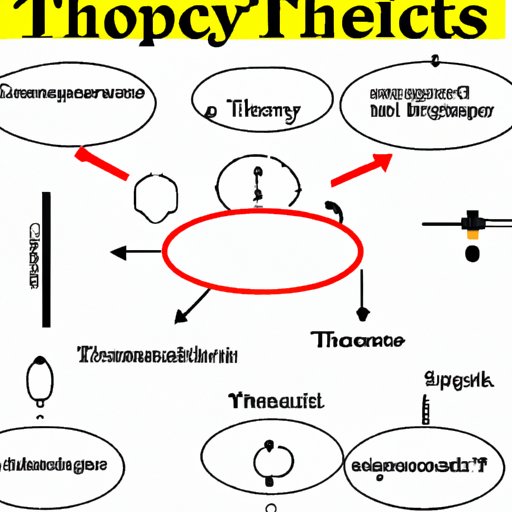Introduction
Theory is an integral part of science, but what exactly does it mean? In this article, we will explore the definition of theory in science and examine its components, complexity, and role in scientific inquiry. We will also discuss the philosophical nature of theory and its limitations.

Examining the Root Definition of Theory in Science
In order to understand the definition of theory in science, it is important to first examine its root definition. According to Merriam-Webster, a theory is “an idea or set of ideas that is intended to explain facts or events.” This definition implies that theories are based on observations and evidence, and can be used to explain phenomena.
So, what are the components of a theory? Generally speaking, theories consist of a number of related hypotheses which are supported by evidence. Hypotheses are testable statements that can be verified through experimentation or observation. Theories may also include models, which are simplified versions of reality that can be used to make predictions about the behavior of a system.
It is also important to note that theories differ from hypotheses. While hypotheses are testable statements, theories are broader explanations of how and why things work. As such, theories are more complex and often require more evidence to support them. For example, the theory of evolution by natural selection is supported by many different lines of evidence, including fossil records, genetic analysis, and experiments.
Exploring the Complexity of Theory in Science
The development of a theory is a complex process that involves both experiment and observation. Experiments are designed to test hypotheses and generate data that can be used to support or refute a theory. Observations are also important; they provide information about the behavior of a system that can be used to develop new hypotheses or refine existing ones.
It is also important to note that theories must be replicated and validated in order to be accepted as valid. Replication involves repeating an experiment multiple times to ensure that the results are consistent. Validation requires testing the predictions made by the theory against real-world observations. If the predictions are accurate, then the theory is considered to be valid.

How Theory in Science is Used to Explain Phenomena
Theories are used to explain phenomena in the natural world. There are many examples of theories that have been used to explain different phenomena, from the theory of gravity to the theory of evolution.
Mathematics is often used to develop theories. Mathematics provides a language for expressing relationships between variables, which can be used to make predictions about the behavior of a system. Additionally, mathematical models can be used to simulate systems and test different scenarios.
Theories can have a great impact on scientific progress. They provide a framework for understanding the world around us and can lead to breakthroughs in our understanding of the universe. For example, Einstein’s theory of relativity revolutionized our understanding of space and time.

A Comprehensive Look at the Definition of Theory in Science
The definition of theory in science goes beyond its root definition and includes many complex concepts. It is important to understand the philosophical nature of theory and its limitations.
Theories are based on observations and evidence, but they are also shaped by philosophical assumptions. Different theories can have different implications for how we view the world, so it is important to consider the philosophical implications of a theory before accepting it.
It is also important to recognize the limitations of theory. Theories are only as good as the evidence that supports them, and even the most well-supported theories can be wrong. Additionally, theories can only explain phenomena within certain limits; they cannot explain everything.
Finally, it is important to evaluate the merits of different theories. Different theories can make different predictions, so it is important to compare them and decide which one best explains the observed phenomena. Additionally, one should consider the philosophical implications of each theory before making a decision.
Understanding the Role of Theory in Scientific Inquiry
The role of theory in scientific inquiry is important. Theory helps scientists formulate questions, design experiments, and interpret results.
Theory can help scientists formulate questions about the natural world. By understanding the implications of different theories, scientists can ask questions that are relevant and meaningful.
Theory can also help scientists design experiments. Experiments are designed to test hypotheses, so understanding the implications of different theories can help scientists design experiments that are likely to yield meaningful results.
Finally, theory can help scientists interpret results. By understanding the implications of different theories, scientists can make informed decisions about which hypotheses are supported by their data.
Conclusion
In conclusion, the definition of theory in science is complex and multifaceted. Theories consist of hypotheses that are supported by evidence, and they are used to explain phenomena in the natural world. Experiments and observations are important for developing and validating theories, and mathematics can be used to make predictions about the behavior of a system. Additionally, the philosophical implications of a theory should be considered before accepting it. Finally, theory plays an important role in scientific inquiry, helping scientists formulate questions, design experiments, and interpret results.
Final Remarks
Theory is an essential part of science, and understanding the definition of theory in science is essential for conducting meaningful research. By exploring the components, complexity, and role of theory in scientific inquiry, we can gain a better understanding of how theories are developed and used to explain phenomena in the natural world.
(Note: Is this article not meeting your expectations? Do you have knowledge or insights to share? Unlock new opportunities and expand your reach by joining our authors team. Click Registration to join us and share your expertise with our readers.)
